




Personal care is a broad term for care related to personal hygiene. The dictionary defines personal care as ‘help given to elderly or infirm people with essential everyday activities such as washing, dressing and meals.’
https://www.collinsdictionary.com/dictionary/english/personal-care
It refers to assistance with daily tasks such as:
Where personal care is provided it is tailored to the needs of individuals and needs to be recorded in a care plan which will also support and encourage the independence of the individual and give psychological and emotional support.
Term cyffredinol am ofal sy'n gysylltiedig â hylendid personol yw gofal personol. Yn ôl diffiniad un geiriadur, ystyr y term yw ‘help given to elderly or infirm people with essential everyday activities such as washing, dressing and meals.’
https://www.collinsdictionary.com/dictionary/english/personal-care
Mae'n cyfeirio at gymorth â thasgau beunyddiol fel:
Lle rhoddir gofal personol, caiff ei deilwra'n unol ag anghenion unigolion ac mae angen ei gofnodi mewn cynllun gofal a fydd hefyd yn helpu ac yn annog yr unigolyn i fod yn annibynnol ac yn rhoi cymorth seicolegol ac emosiynol.

When providing personal care, it is important to respect the dignity, choices, wishes and preferences of individuals. Individuals should be empowered and remain in control of what is happening to them. Choice and control are key aspects of promoting dignity.
This can be done in a number of ways:
Wrth roi gofal personol, mae'n bwysig parchu urddas unigolion, eu dewisiadau, eu dymuniadau a'r hyn sydd orau ganddynt. Dylai unigolion gael eu grymuso a pharhau i fod â rheolaeth dros yr hyn sy'n digwydd iddynt. Mae dewis a rheolaeth yn agweddau allweddol ar hybu urddas.
Gellir gwneud hyn mewn nifer o ffyrdd:
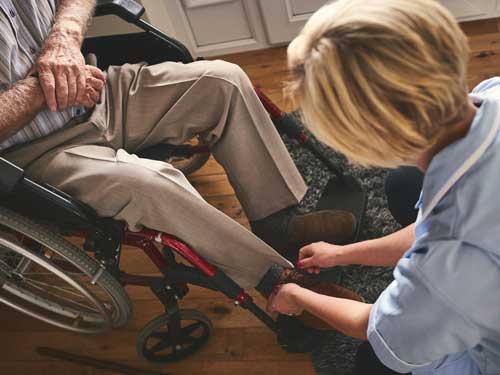
It is important that the privacy and dignity of individuals are respected at all times during personal care.
This can be supported in a number of ways:
Mae'n bwysig parchu preifatrwydd ac urddas unigolion bob amser yn ystod gofal personol.
Gellir gwneud hyn mewn nifer o ffyrdd:
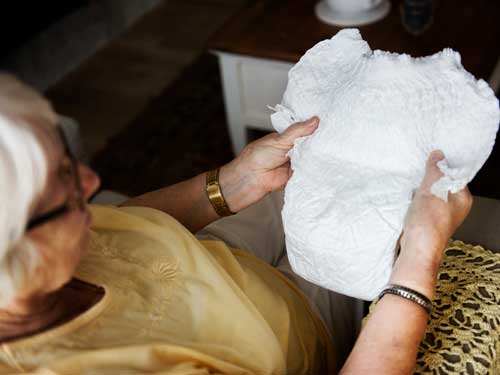
Continence refers to control of the bladder and bowel. It is the ability to retain urine or faeces until the proper time or place for their release. A continent individual knows when they need the bathroom and uses it.
Ystyr ymataliaeth yw rheolaeth dros y bledren a'r coluddyn, hynny yw, y gallu i ddal wrin neu ysgarthion nes bod amser neu le priodol i'w rhyddhau. Mae unigolyn ymataliol yn gwybod pryd mae angen defnyddio'r toiled ac yn gwneud hynny.
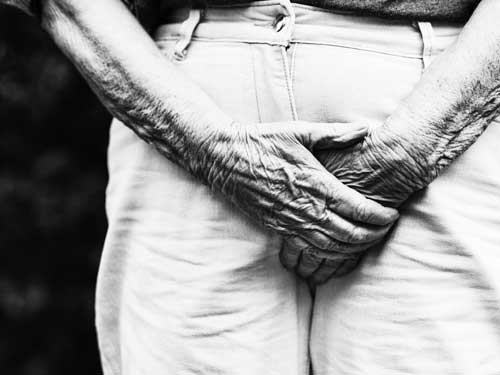
Incontinence can be upsetting for both the individual involved and those around them.
Incontinence can affect work, exercise, sex and one's social life, having a significant impact on well-being and self-esteem. Many individuals who have difficulties with continence also experience depression.
If an individual is unable to exercise, this will impact on their weight which may exacerbate continence problems. Daily routines, such as housework and shopping, can become a problem leading to poor nutrition and living conditions. Individuals may feel dirty, worry that they smell or their clothes are soiled and can become isolated and depressed or anxious. Feelings of frustration or anger may be displayed.
Incontinence can affect performance and confidence at work with frequent toilet visits which an individual may not feel comfortable explaining to their manager. It may limit choices of clothing, which will have a negative impact on self-esteem.
Individuals who need the toilet frequently at night are not getting enough rest, which will affect concentration and lower the immune system, making them more vulnerable to illness.
Gall anymataliaeth beri gofid i'r unigolyn dan sylw ac i bobl o'i gwmpas.
Gall ymataliaeth effeithio ar waith, ymarfer corff, rhyw a bywyd cymdeithasol, gan gael effaith sylweddol ar lesiant a hunan-barch. Mae llawer o unigolion sy'n wynebu problemau ymataliaeth hefyd yn profi iselder.
Os na all unigolyn wneud ymarfer corff, bydd hyn yn effeithio ar ei bwysau, a all waethygu problemau ymataliaeth. Gall arferion dyddiol fel gwaith tŷ a siopa fynd yn broblem gan arwain at faethiad ac amodau byw gwael. Gall unigolion deimlo'n fudr, poeni eu bod yn drewi neu fod eu dillad wedi'u baeddu a mynd yn ynysig ac yn isel neu'n bryderus. Gellir arddangos teimladau o rwystredigaeth neu ddicter.
Gall anymataliaeth effeithio ar berfformiad a hyder yn y gwaith, e.e. os bydd unigolyn yn mynd i'r toiled yn aml ac efallai ddim yn teimlo'n gyfforddus yn esbonio hynny i'w reolwr. Gall gyfyngu ar ddewisiadau o ran dillad, a fydd yn cael effaith negyddol ar hunan-barch.
Nid yw unigolion sydd angen mynd i'r toiled yn aml yn ystod y nos yn cael digon o orffwys, a fydd yn effeithio ar eu gallu i ganolbwyntio ac yn gostwng eu system imiwnedd, gan olygu eu bod yn fwy agored i salwch.

It is important that the different beliefs, sexual preferences and values of individuals are respected in the management of continence to ensure they receive appropriate support.
Gender, sexual preferences, beliefs, religion and culture can impact on the wishes of individuals. If these are not considered and followed, it may result in social isolation and healthcare issues.
Individuals from all backgrounds may experience embarrassment regarding continence issues and may not be willing to discuss them with a professional of the opposite sex. They could also feel uncomfortable undressing in front of others.
In some cultures, it is forbidden for women to expose their bodies to men apart from their husbands who they may not wish to discuss issues with, so they will avoid any physical examinations.
Incontinence can have an effect on religion for some cultures (in particular Jewish and Muslim women) as it affects the need for cleanliness during prayer. Muslim women have a strong preference for female doctors. This is for cultural reasons. Barriers to communication and language differences may prevent discussion in regard to continence. If translators are used, individuals may be concerned about confidentiality. Individuals may be reluctant to use family members to translate because of embarrassment.
Transgender men may struggle to find the appropriate toilet for them to use. However, things are improving in this area as there are now LGBT toilets in most city centres and buildings around the UK where younger members of the public frequent. Most FE colleges and universities offer these facilities.
Mae'n bwysig bod credoau, cyfeiriadedd rhywiol a gwerthoedd unigolion yn cael eu parchu wrth reoli ymataliaeth er mwyn sicrhau eu bod yn cael cymorth priodol.
Gall rhywedd, cyfeiriadedd rhywiol, credoau, crefydd a diwylliant effeithio ar ddymuniadau unigolion. Os na chaiff y rhain eu hystyried a'u dilyn, gall hynny arwain at ynysu cymdeithasol a phroblemau gofal iechyd.
Gall unigolion o bob cefndir deimlo cywilydd mewn perthynas â phroblemau ymataliaeth, ac efallai na fyddant yn fodlon eu trafod â gweithiwr proffesiynol o'r rhyw arall. Gallent hefyd deimlo'n anghyfforddus yn dadwisgo o flaen pobl eraill.
Mewn rhai diwylliannau, gwaherddir menywod rhag dangos eu cyrff i ddynion ar wahân i'w gwŷr na fyddant o bosibl yn dymuno trafod problemau â nhw, felly byddant yn osgoi unrhyw archwiliadau corfforol.
Gall anymataliaeth effeithio ar grefydd mewn rhai diwylliannau (yn enwedig menywod Iddewig a Mwslimaidd) am fod hynny'n effeithio ar yr angen i fod yn lân wrth weddïo. Mae'n well o lawer gan fenywod Mwslimaidd weld meddygon benywaidd, a hynny am resymau diwylliannol. Gall rhwystrau rhag cyfathrebu a gwahaniaethau iaith atal trafodaeth ynglŷn ag ymataliaeth. Os defnyddir cyfieithwyr, efallai y bydd unigolion yn pryderu am gyfrinachedd. Gall unigolion fod yn amharod i ddefnyddio aelodau o'r teulu i gyfieithu am eu bod yn teimlo cywilydd.
Gall dynion trawsrywiol ei chael hi'n anodd dod o hyd i'r toiled priodol i'w ddefnyddio. Fodd bynnag, mae pethau'n gwella yn y maes hwn gan fod toiledau LGBT bellach ar gael yn y rhan fwyaf o ganol dinasoedd ac adeiladau ledled y DU y bydd aelodau iau o'r cyhoedd yn eu mynychu. Mae'r rhan fwyaf o golegau addysg bellach a phrifysgolion yn cynnig y cyfleusterau hyn.

A number of aids and types of equipment can support the management of continence and assist individuals in having a normal life.
These include:
Gall nifer o gymhorthion a mathau o gyfarpar helpu i reoli ymataliaeth a chynorthwyo unigolion i fyw bywyd normal.
Mae’r rhain yn cynnwys:
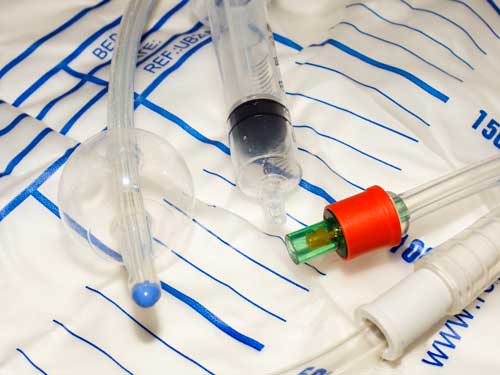
A range of professionals may help with continence management.
These include:
Gall amrywiaeth o weithwyr proffesiynol helpu i reoli ymataliaeth.
Mae’r rhain yn cynnwys:
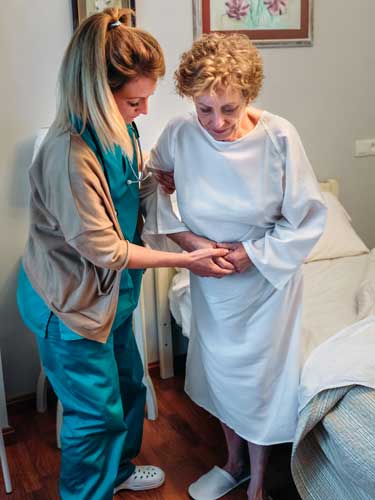
Personal care routines would include personal hygiene, bathing, cleaning teeth, menstruation and continence management.
During personal care routines it is important to protect both the individual and the worker supporting them.
This can be done in a number of ways:
Byddai arferion gofal personol yn cynnwys hylendid personol, ymolchi, brwsio dannedd, misglwyf a rheoli ymataliaeth.
Yn ystod arferion gofal personol, mae'n bwysig diogelu'r unigolyn â'r gweithiwr sy'n ei gefnogi.
Gellir gwneud hyn mewn nifer o ffyrdd: